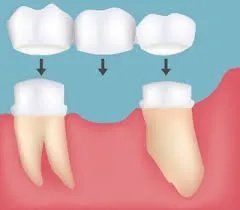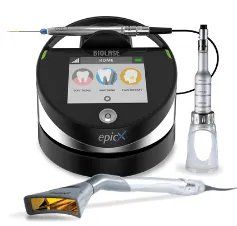All Treatment Options
Dental Fillings
Crowns
Dental Bridges
Tooth Extractions
Dentures
Root Canals
Laser Gum Treatment
Dental Fillings
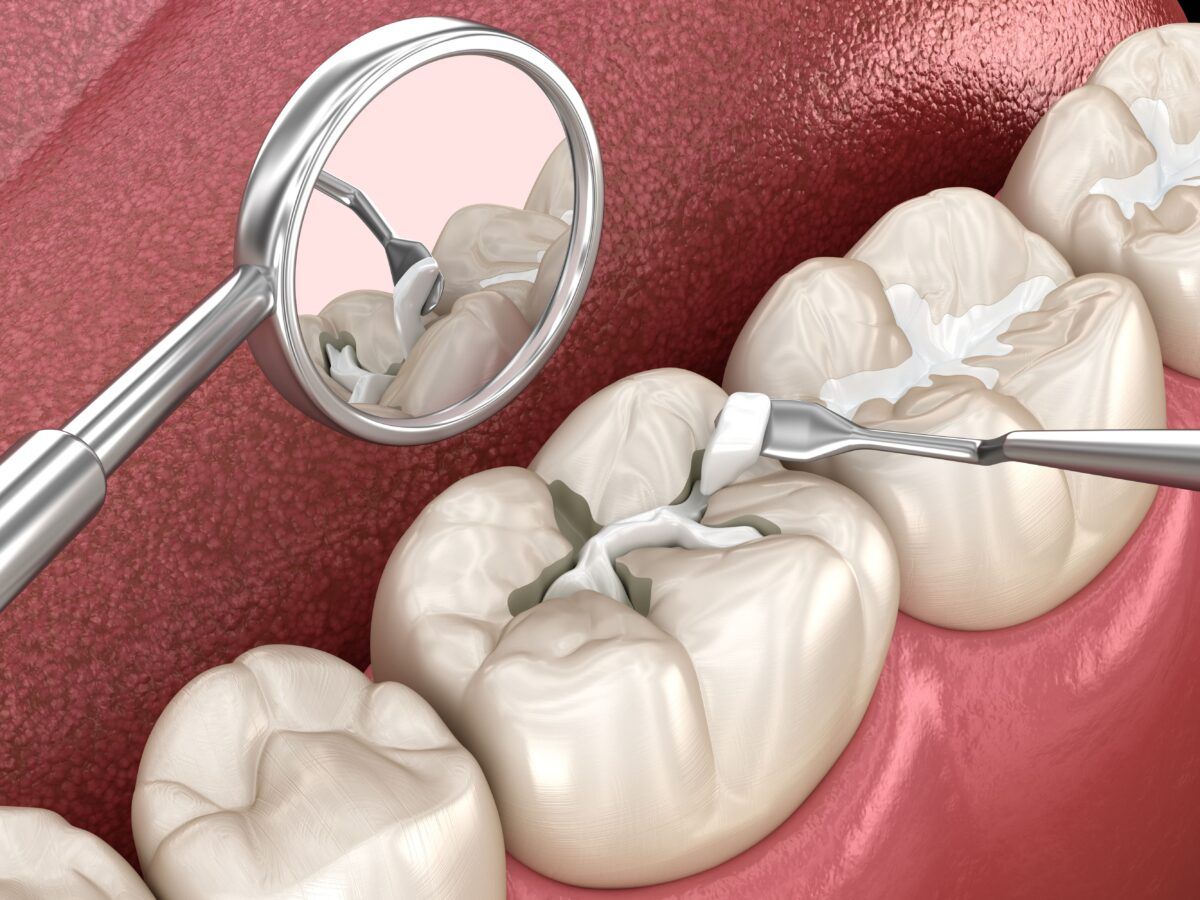 Composite Fillings
Composite Fillings
General dentistry encompasses a broad range of diseases and disorders of the oral and maxillofacial region. Everyone should see a general dentist for routine oral health examinations, twice-yearly cleanings, and treatment of routine oral health complications, such as minor tooth decay. General dentistry is as much about prevention as it is about treatment. Patients who visit a general dentist can expect professional oral health care, as well as education and advisement about self-care between office visits.
Did you know…
that the American Dental Association recommends that every American visit a general dentist a minimum of one time every six months? Doing so can aid in the detection of decay, oral disease and other dental health problems before the progress and become severe. If you are at risk for certain complications or have a history or periodontal disease and advanced decay, you may need to visit your general dentist on a more frequent basis. Patients who visit their dentist regularly and as recommended are more likely to retain their natural teeth and enjoy a lifetime of good oral health.Frequently Asked Questions
Do I need to visit a general dentist?
Yes. Even if you are not currently experiencing any symptoms of tooth decay or gum disease, it is important to visit your dentist for a thorough examination and cleaning. Despite daily brushing and flossing, your teeth can still accumulate tartar that can harbor bacteria. These bacteria can lead to gum disease and tooth decay if not professionally removed at your dentist’s office.What should I expect during my dentist visit?
Your visit will begin with a general inspection of the condition of your teeth. If you have not been to the dentist in a while, your dentist may order x-rays. An oral hygienist will then use special metal instruments to gently scrape away tartar along your gum line. Later, your dentist will review your x-rays and discuss any symptoms you may have been experiencing. He or she will then make a recommendation for treatment (if applicable) and answer any questions you may have.Are there any special instructions I need to follow after seeing my dentist?
Based on the results of your dental check-up, your general dentist may recommend that you return for treatment or follow a special at-home oral care plan. You may also be referred to a dental specialist for treatment of advanced oral health conditions.Crowns
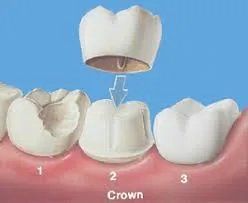
A crown is a dental restoration that completely covers the outside of a tooth that is cracked, broken, worn down, or severely decayed. Dental crowns are usually completed in two visits. During the first visit, the tooth is prepared (shaved down) and an impression is taken. A temporary crown is placed while the permanent crown is fabricated. During the second visit, the permanent crown is carefully fitted and then cemented into place.
If a tooth has more extensive decay, a dental crown may be the ideal aesthetic and functional restorative solution.
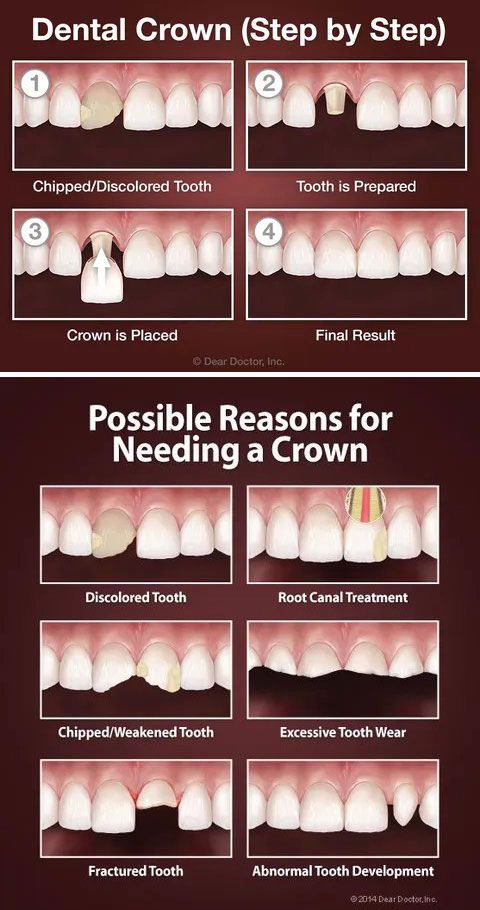 Choosing to have a crown placed can preserve the natural tooth, which is always the goal as preserving the natural teeth helps maintain the supporting bone structure and stability of the surrounding and adjacent teeth.
The first step in the process is to take an impression that will be used to make a model of the teeth and bite. This allows the crown to be made to look and function like your natural tooth. The tooth will then be prepped, with the decayed areas being removed. An impression of the prepped tooth will be made so that the final crown will fit properly when it is placed.
Sometimes the final crown can be placed on the same day but other times a temporary crown will be placed while your final restoration is being created. Crowns often last a lifetime with proper care and oral hygiene.
There are four main types of dental crowns:
Choosing to have a crown placed can preserve the natural tooth, which is always the goal as preserving the natural teeth helps maintain the supporting bone structure and stability of the surrounding and adjacent teeth.
The first step in the process is to take an impression that will be used to make a model of the teeth and bite. This allows the crown to be made to look and function like your natural tooth. The tooth will then be prepped, with the decayed areas being removed. An impression of the prepped tooth will be made so that the final crown will fit properly when it is placed.
Sometimes the final crown can be placed on the same day but other times a temporary crown will be placed while your final restoration is being created. Crowns often last a lifetime with proper care and oral hygiene.
There are four main types of dental crowns:
Ceramic
This type of crown is often used for teeth that are visible when smiling as they are made from a porcelain-based material that retains the look of your natural teeth.Base Metal Alloys
These are strong and corrosion-resistant and are often used when there is less existing tooth structure available to support the crown restoration.These crowns are known for their strength and durability while also allowing for a natural-looking restoration.Gold Alloys
These may be used when more strength is needed, particularly for patients who grind their teeth at night.Base Metal Alloys
These are strong and corrosion-resistant and are often used when there is less existing tooth structure available to support the crown restoration.Dental Bridges
Multiple Teeth
A bridge can replace missing teeth without the use of a denture or dental implant. A bridge is composed of two crowns and a replacement tooth or teeth. Crowns are typically placed on the teeth on either side of the space, with the fabricated tooth or teeth attached in between. For multiple missing teeth, implants can be used to anchor the teethMissing one or more teeth is common for many people.
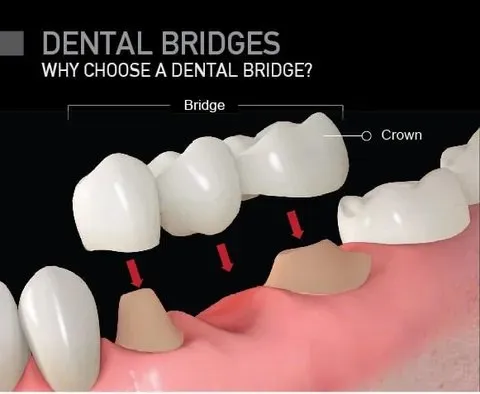
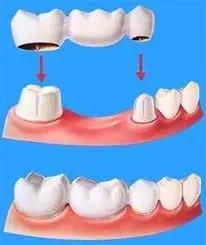
Tooth Extractions
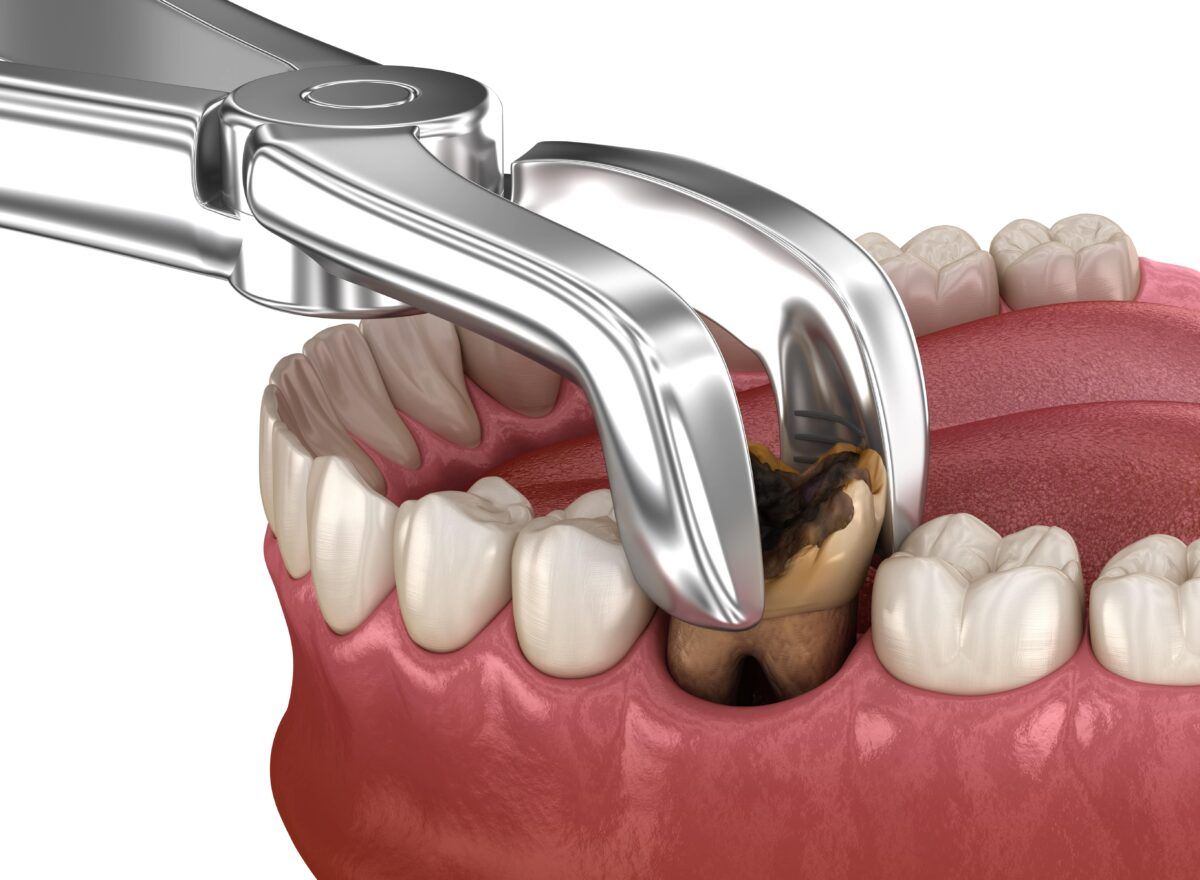 Tooth extractions are routine dental procedures used to remove decayed, damaged or otherwise problematic teeth. Dentists usually make every effort to preserve natural teeth, although sometimes an extraction is necessary. Although the procedure is performed in a dentist’s or oral surgeon’s office, it is considered surgery. Depending on which teeth are removed, they may be replaced with a dental implant or another oral prosthetic.
Tooth extractions are routine dental procedures used to remove decayed, damaged or otherwise problematic teeth. Dentists usually make every effort to preserve natural teeth, although sometimes an extraction is necessary. Although the procedure is performed in a dentist’s or oral surgeon’s office, it is considered surgery. Depending on which teeth are removed, they may be replaced with a dental implant or another oral prosthetic.
Did You Know?
Platelet-rich fibrin (PRF) is a substance taken from your own blood that helps to promote healing. When applied after a tooth extraction, PRF helps to stimulate the healing process and acts as a bioactive band-aid.Frequently Asked Questions
Do I need a tooth extraction?
There are several reasons why you could need a tooth extraction. The most common cause of tooth extractions is severe tooth decay and cavities. However, many patients also undergo extractions for impacted teeth – particularly wisdom teeth. Other causes for extraction include advanced periodontal disease, cracked teeth, and teeth that are severely malformed. Although many circumstances that require extraction are unavoidable, some could be prevented with regular visits to the dentist for exams and cleanings. However, only your dentist can tell you if you need a tooth extraction. To determine if an extraction is needed, schedule an appointment with our office today.What should I expect during my tooth extraction appointment?
If you and your dentist decide to extract one or more teeth, you will be scheduled to return for oral surgery at a later date. You will be given a local anesthetic to prevent pain during the procedure, and you may be prescribed medications to help manage pain in the hours following your extraction. Depending on the nature of your extraction and other factors, such as whether your teeth are impacted, you may also be sedated or given general anesthesia during your procedure.What type of post-treatment care will I need to follow?
We place platelet-rich fibrin (PRF) around the extraction site in order to improve local blood supply, enhance healing, and shorten the recovery process. Nevertheless, post-operative care following a tooth extraction is essential for healing and preventing complications. You will be instructed to avoid certain foods and also keep the surgical site clean at all times. If you are prescribed an antibiotic, it is important that you complete the course of treatment to prevent infection. Finally, you may be advised to avoid smoking or drinking through a straw, as doing so may delay the healing process and cause a condition known as ‘dry socket.’Dentures
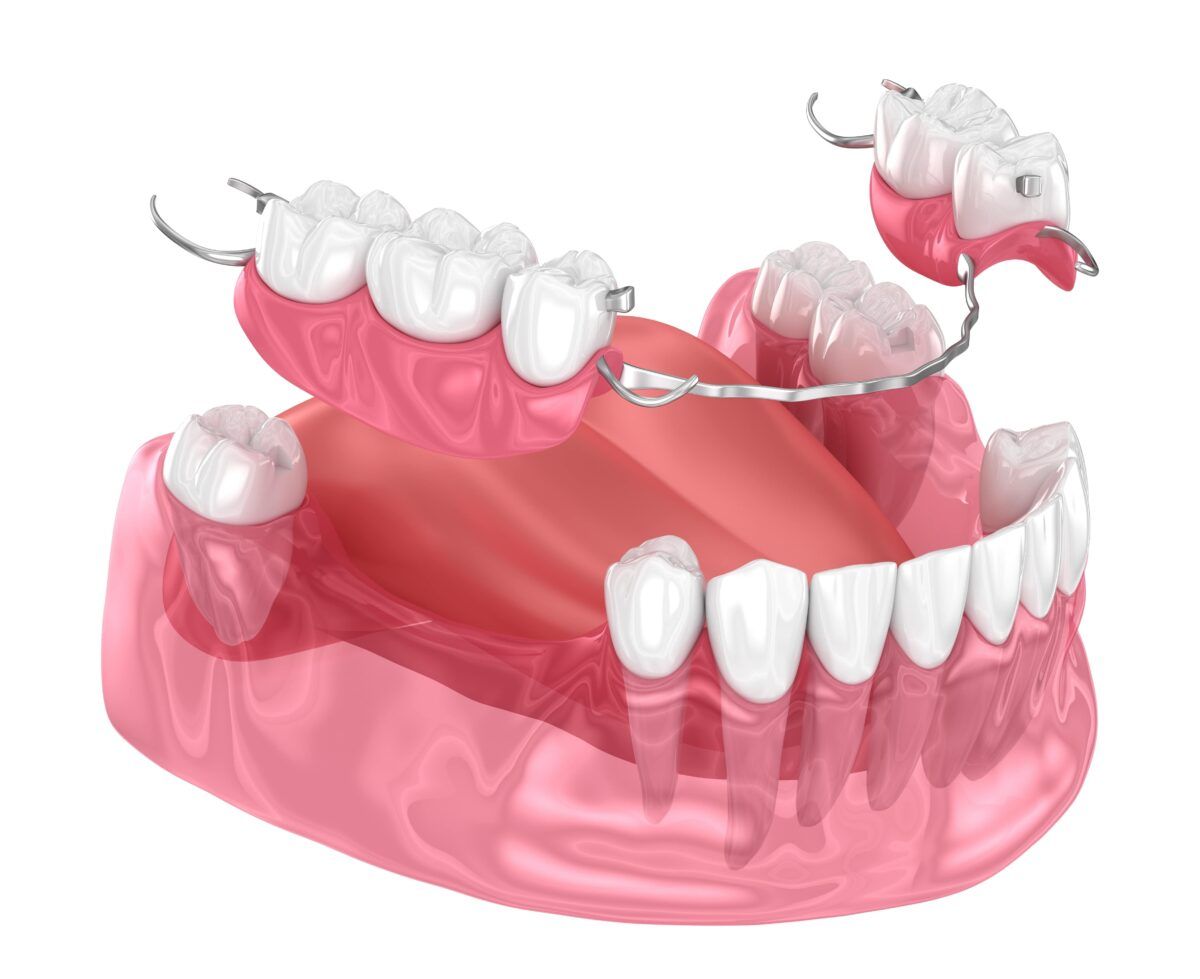 Millions of people have lost all of their natural teeth, leaving most looking for tooth replacement solutions. Of them, many turn to dentures, which remain one of the most common and affordable dental prosthetics used in modern dentistry. If dentures are a part of your practice, make sure you only use a dental lab you can rely on for quality production, quick turnaround, and an accurate fit.
Simply extract any damaged or decayed teeth that remain in a patient’s mouth, and take an impression of the patient’s gum line and the roof of his or her mouth. Then, send the results to our lab for the fabrication process. We will have your patient’s new dentures completed and returned to you for fitting as quickly as possible.
Millions of people have lost all of their natural teeth, leaving most looking for tooth replacement solutions. Of them, many turn to dentures, which remain one of the most common and affordable dental prosthetics used in modern dentistry. If dentures are a part of your practice, make sure you only use a dental lab you can rely on for quality production, quick turnaround, and an accurate fit.
Simply extract any damaged or decayed teeth that remain in a patient’s mouth, and take an impression of the patient’s gum line and the roof of his or her mouth. Then, send the results to our lab for the fabrication process. We will have your patient’s new dentures completed and returned to you for fitting as quickly as possible.
Premium Denture Technology
We are always learning about new technology and techniques for creating highly functional and more attractive dentures. There are many different materials that can be used to fabricate dentures, and we do our best to ensure a natural look and fit. All of our dentures are made with the patient’s individual anatomy in mind. We never compromise quality for value, because there is no acceptable way to cut corners when it comes to your patients’ quality of life. We aim to create dentures that look and feel as natural as possible, allowing patients the confidence to speak clearly and eat with greater confidence. When you choose our lab for your denture fabrication needs, you are choosing to work with a team of technicians and professionals who are committed to the highest standards of service and accuracy. We work hard to stay at the forefront of restorative dental technology and help lead the industry in efficiency and reliability. Practices that work with us learn to expect fast and dependable results, time after time.Root Canals
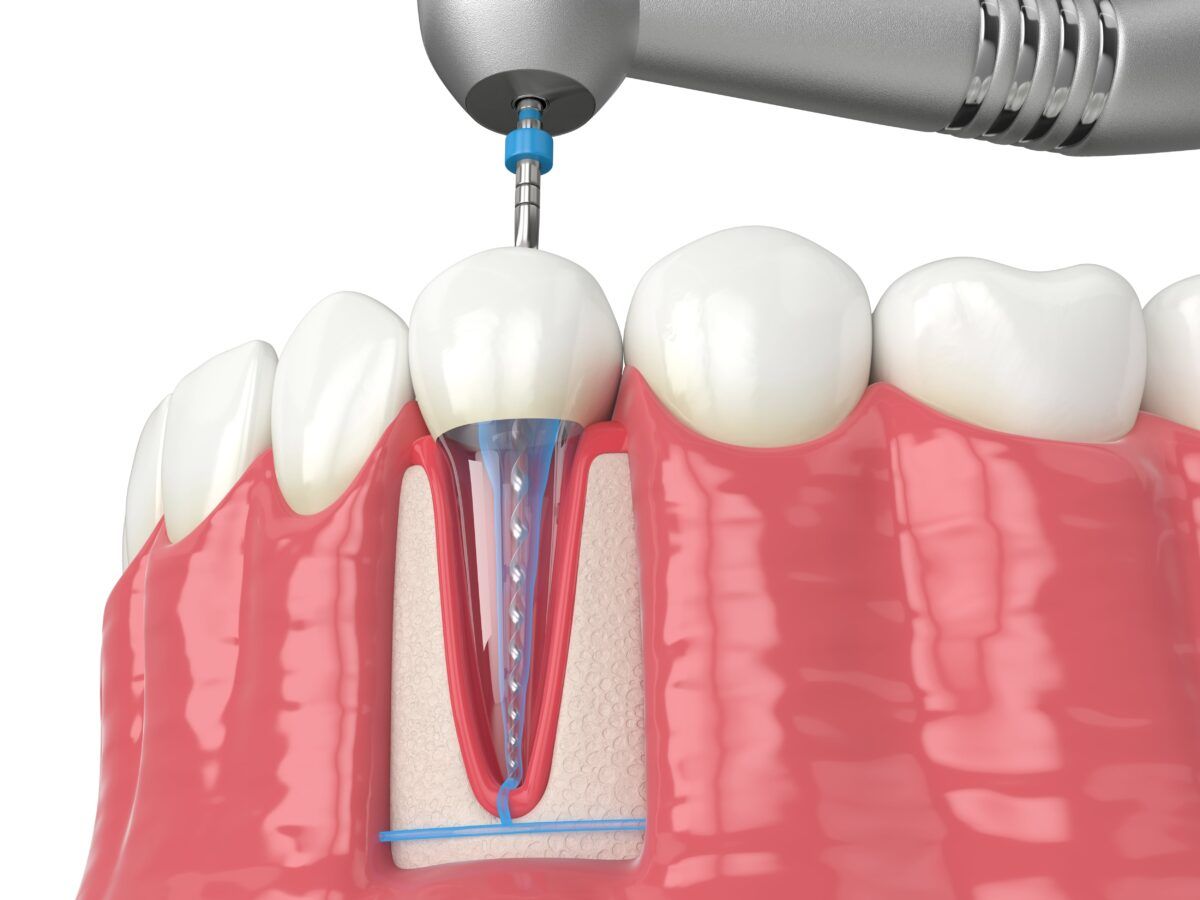 Root canals are valuable dental procedures used to treat and preserve teeth with badly infected roots. The pulp is the live portion of the tooth that extends into the root and contains nerve endings and tissues. When it becomes infected, patients can experience pain, swelling and even total tooth loss unless treated. Root canals remove the damaged parts of the tooth and infected root. In some cases, an antibiotic is prescribed to help prevent further infection within the tooth. The organic portion of the tooth that remains may be restored using a cap or crown that provides a natural appearance and normal tooth function.
Root canals are valuable dental procedures used to treat and preserve teeth with badly infected roots. The pulp is the live portion of the tooth that extends into the root and contains nerve endings and tissues. When it becomes infected, patients can experience pain, swelling and even total tooth loss unless treated. Root canals remove the damaged parts of the tooth and infected root. In some cases, an antibiotic is prescribed to help prevent further infection within the tooth. The organic portion of the tooth that remains may be restored using a cap or crown that provides a natural appearance and normal tooth function.
Many patients associate root canals with pain and discomfort.
But local anesthetics and advancements in modern dentistry have made root canals highly tolerable procedures that are often no less comfortable than getting a standard filling. Upon completion, a restored tooth that has undergone a root canal will blend in with surrounding teeth – virtually undetectable to the average eye. More than 9 out of 10 root canal procedures are successful, and most treatments last many years or even a lifetime.Frequently Asked Questions
Am I a candidate for a root canal?
You could be a candidate for a root canal if decay or damage has allowed bacteria to infect the pulp inside your tooth. A root canal could also be the right treatment for you if you prefer to preserve as much of your natural tooth as possible instead of extracting both the healthy and diseased portions of your tooth. For more information about root canals and whether they are right for you, schedule a dental exam and consultation at your earliest convenience.What should I expect during my root canal treatment?
If you decide to undergo a root canal, the first step in your procedure will involve a local anesthetic. Once your tooth root is numb, the diseased portion of your tooth pulp will be removed and potentially treated for bacterial infection. The tooth will then be sealed and filled before being restored with a crown.What type of post-treatment care is required after a root canal?
It is normal for teeth to become inflamed after a root canal, potentially causing sensitivity for the first several days following treatment. However, normal brushing and flossing habits can be resumed immediately after treatment and restoration is complete.Laser Gum Treatment
Laser Procedures
Our soft tissue laser allows us to perform a variety of gum related surgical procedures. Most often, these procedures do not require the use of anesthetic. These procedures include laser removal of diseased, infected, inflamed or necrosed soft tissue, pain relief for canker sores or cold sores, and tooth whitening. Please feel free to call the office if you have any questions about our laser procedures.

